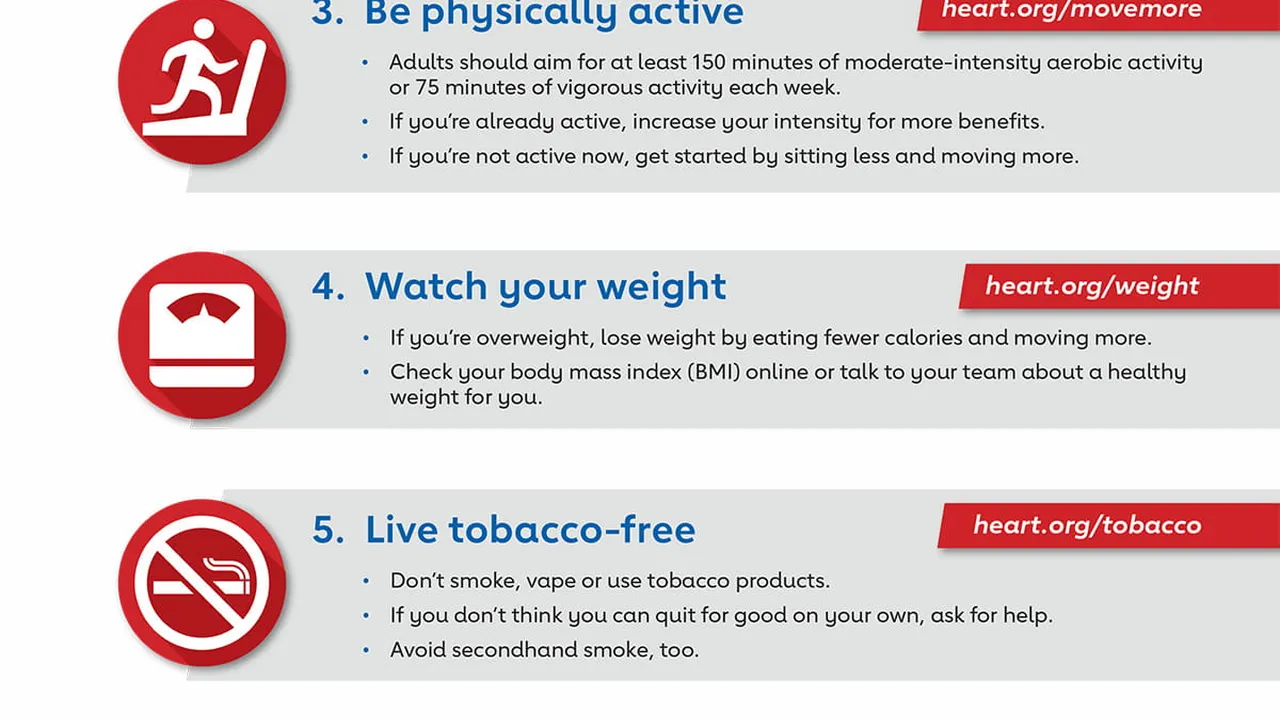How to Reduce Your Risk of Heart Disease
normal text: Discover effective strategies for quitting smoking and overcoming nicotine addiction Reclaim your health and live a longer healthier life

Understanding Nicotine Addiction The First Step to Quitting
Okay, so you're thinking about quitting smoking? That's fantastic! Seriously, it's one of the best decisions you can make for your health. But let's be real, it's not a walk in the park. Nicotine addiction is a powerful thing. Understanding how it works is the first crucial step. Nicotine, the addictive substance in cigarettes, stimulates the release of dopamine in the brain, creating a pleasurable sensation. Over time, your brain becomes dependent on this dopamine rush, leading to cravings and withdrawal symptoms when you try to quit.
Withdrawal symptoms can include irritability, anxiety, difficulty concentrating, increased appetite, and, of course, intense cravings for a cigarette. These symptoms are often the biggest hurdles for people trying to quit. Knowing what to expect can help you prepare and develop strategies to manage them.
Choosing Your Quitting Method Nicotine Replacement Therapy (NRT) vs Cold Turkey vs Prescription Medication
There's no one-size-fits-all approach to quitting smoking. What works for your best friend might not work for you. Luckily, there are several different methods to choose from.
Nicotine Replacement Therapy (NRT) Options Patches, Gum, Lozenges, Inhalers, and Nasal Sprays
NRT helps you gradually reduce your nicotine intake without the harmful chemicals found in cigarettes. It comes in various forms, each with its own pros and cons:
- Nicotine Patches: These are applied to the skin and release a steady dose of nicotine throughout the day. They're convenient and require minimal effort, making them a good choice for those who want a consistent nicotine level.
Product Recommendation: Nicoderm CQ Nicotine Patch. These are widely available, offer a variety of strengths, and are relatively affordable. A two-week supply (14 patches) typically costs around $40-$60. Use scenarios: Great for those who want a steady nicotine level throughout the day and don't want to think about it. Best for those who smoke more than 10 cigarettes a day. Comparison: Compared to gum or lozenges, patches provide a slower, more consistent nicotine release. - Nicotine Gum: This allows you to control your nicotine intake by chewing it when cravings strike. It's a good option for those who need immediate relief from cravings and like the oral fixation of chewing.
Product Recommendation: Nicorette Nicotine Gum. This is a popular and effective option. It comes in various flavors and strengths. A pack of 100 pieces typically costs around $30-$45. Use scenarios: Ideal for those who experience sudden cravings and need immediate relief. Good for those who enjoy chewing. Comparison: Compared to patches, gum provides a faster, but less consistent, nicotine release. - Nicotine Lozenges: Similar to gum, lozenges dissolve in your mouth and release nicotine. They're discreet and can be used in situations where chewing gum isn't appropriate.
Product Recommendation: Commit Nicotine Lozenges. These are a good alternative to gum, especially for those with dental work. A pack of 80 lozenges typically costs around $35-$50. Use scenarios: Suitable for those who want a discreet option for managing cravings, and are good for people who can't chew gum for dental or other reasons. Comparison: Lozenges offer a similar nicotine release profile to gum, but without the chewing. - Nicotine Inhalers: These deliver nicotine vapor that you inhale. They mimic the hand-to-mouth action of smoking, which can be helpful for some smokers.
Product Recommendation: Nicotrol Inhaler. This requires a prescription. It provides a metered dose of nicotine vapor. A prescription and refill typically cost around $50-$75. Use scenarios: Good for those who miss the physical sensation of holding and inhaling a cigarette. Comparison: Inhalers offer a more controlled and predictable nicotine delivery compared to gum or lozenges. - Nicotine Nasal Sprays: These deliver nicotine directly into the nasal passages. They provide the fastest nicotine delivery of all NRT options, but can also cause nasal irritation.
Product Recommendation: Nicotrol NS Nasal Spray. This also requires a prescription. It provides the fastest nicotine delivery. A prescription and refill typically cost around $60-$80. Use scenarios: Best for those who need rapid relief from intense cravings, but be prepared for potential nasal irritation. Comparison: Nasal sprays provide the fastest nicotine delivery, but also have the highest risk of side effects.
Cold Turkey Quitting All At Once
This involves stopping smoking abruptly without any NRT or medication. It's a challenging method, but some people find it to be the most effective. It requires strong willpower and a solid support system. The success rate for cold turkey quitting is generally lower than with NRT or medication, but it's certainly possible.
Prescription Medications Options Bupropion (Zyban) and Varenicline (Chantix)
These medications work by affecting the chemicals in your brain to reduce cravings and withdrawal symptoms. They don't contain nicotine, but they can be very effective in helping people quit. It's important to discuss these options with your doctor, as they may have side effects.
- Bupropion (Zyban): This antidepressant helps reduce cravings and withdrawal symptoms. It's typically started a week or two before your quit date.
Product Recommendation: Generic Bupropion SR. This is a widely prescribed medication for smoking cessation. A one-month supply typically costs around $30-$50 with insurance, and $100-$150 without. Use scenarios: Best for those who also experience depression or anxiety, as it can address both issues. Comparison: Bupropion doesn't contain nicotine, so it's a good option for those who want to avoid NRT altogether. - Varenicline (Chantix): This medication blocks nicotine receptors in the brain, reducing the pleasurable effects of smoking and decreasing cravings.
Product Recommendation: Chantix. This is a highly effective medication for smoking cessation, but it can have more significant side effects. A one-month supply typically costs around $150-$250. Use scenarios: Best for those who have tried other methods unsuccessfully and are committed to quitting. Comparison: Varenicline is generally considered more effective than Bupropion, but it also has a higher risk of side effects.
Building Your Support System Tell Family and Friends Join a Support Group
Quitting smoking is easier when you have support. Tell your family and friends about your plan to quit, and ask for their encouragement and understanding. Avoid situations that might trigger cravings, such as spending time with smokers or going to bars. Consider joining a support group, either online or in person. Sharing your experiences with others who are going through the same thing can be incredibly helpful.
Managing Cravings and Withdrawal Symptoms Identify Triggers Use Distractions Practice Relaxation Techniques
Cravings are inevitable, but they don't have to derail your quit attempt. Identify your triggers – the situations, people, or emotions that make you want to smoke. Once you know your triggers, you can develop strategies to avoid them or cope with them when they arise.
Distractions can be a lifesaver when cravings hit. Try going for a walk, reading a book, listening to music, or calling a friend. Anything that takes your mind off smoking can help.
Relaxation techniques, such as deep breathing, meditation, or yoga, can help you manage stress and anxiety, which can often trigger cravings. Find a relaxation technique that works for you and practice it regularly.
Lifestyle Changes Diet Exercise Sleep
Making healthy lifestyle changes can significantly boost your chances of quitting successfully. Eat a healthy diet, exercise regularly, and get enough sleep. These changes can improve your overall health and well-being, making it easier to cope with the challenges of quitting.
Dealing With Setbacks Dont Give Up Learn From Your Mistakes
Everyone slips up sometimes. If you have a cigarette, don't beat yourself up about it. Just learn from your mistake and get back on track. A single cigarette doesn't mean you've failed. It just means you need to redouble your efforts.
Alternative Therapies Hypnosis Acupuncture
Some people find alternative therapies, such as hypnosis or acupuncture, helpful in quitting smoking. While the evidence for their effectiveness is mixed, they may be worth exploring if you're looking for additional support.
Setting Realistic Goals Celebrate Small Victories
Don't try to do too much too soon. Set realistic goals for yourself and celebrate small victories along the way. Reward yourself for reaching milestones, such as going a day, a week, or a month without smoking.
Staying Motivated Visualize Success Remember Your Reasons for Quitting
Quitting smoking is a marathon, not a sprint. It's important to stay motivated throughout the process. Visualize yourself as a non-smoker, and remember all the reasons why you wanted to quit in the first place – your health, your family, your finances.
The Long-Term Benefits of Quitting Smoking Improved Health Increased Energy Reduced Risk of Disease Longer Lifespan
The benefits of quitting smoking are numerous and far-reaching. You'll improve your health, increase your energy levels, reduce your risk of disease, and potentially live a longer life. Quitting smoking is an investment in your future.
Quitting Apps and Online Resources Smoke Free App, QuitNow App
There are many helpful apps and online resources available to support you on your quitting journey.
- Smoke Free App: This app provides personalized support, tracks your progress, and offers tips and strategies for managing cravings. It's a great way to stay motivated and accountable.
- QuitNow App: This app tracks your progress, shows you how much money you've saved, and connects you with a community of other quitters.
Remember You Can Do It
Quitting smoking is challenging, but it's absolutely possible. With the right strategies, support, and determination, you can overcome nicotine addiction and reclaim your health. Don't give up on yourself. You've got this!
:max_bytes(150000):strip_icc()/277019-baked-pork-chops-with-cream-of-mushroom-soup-DDMFS-beauty-4x3-BG-7505-5762b731cf30447d9cbbbbbf387beafa.jpg)






